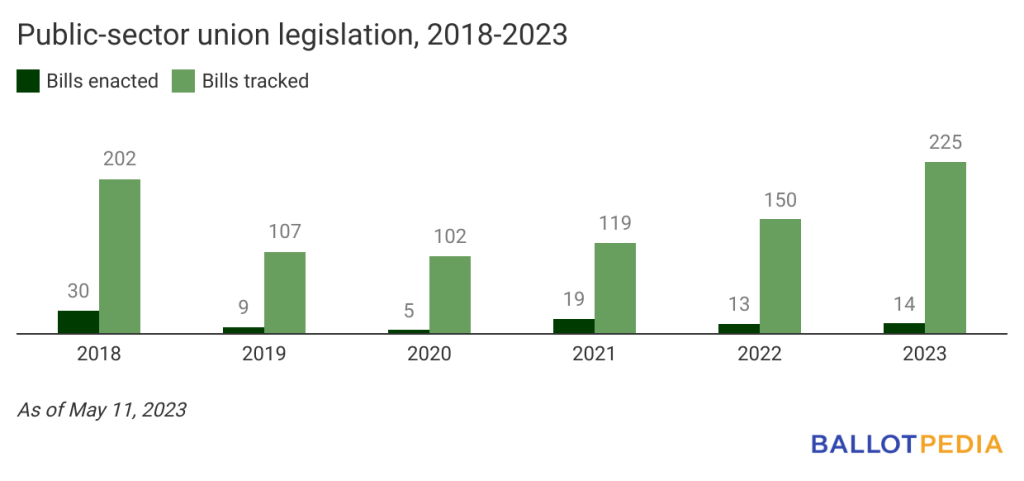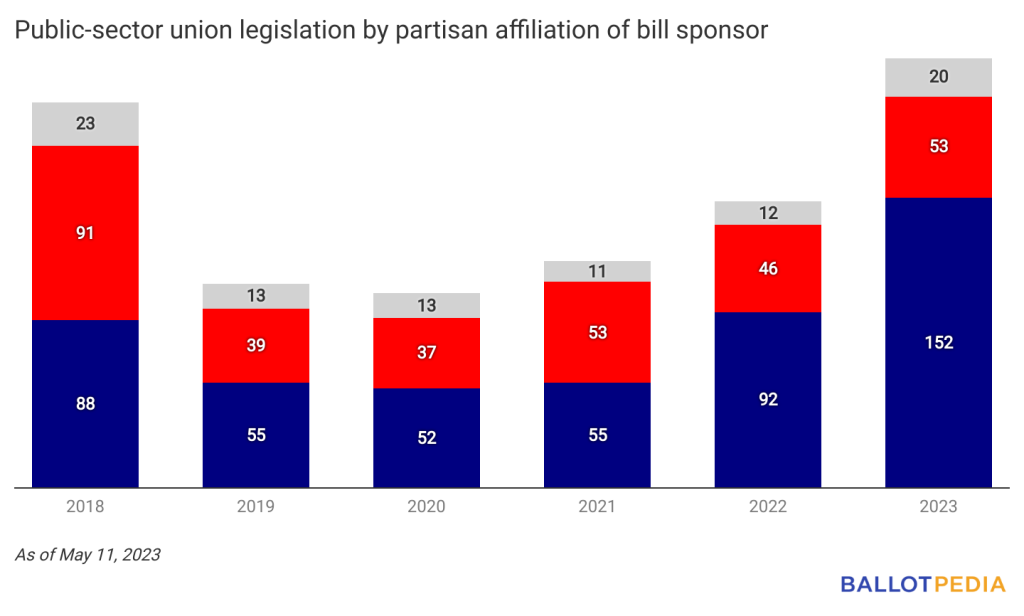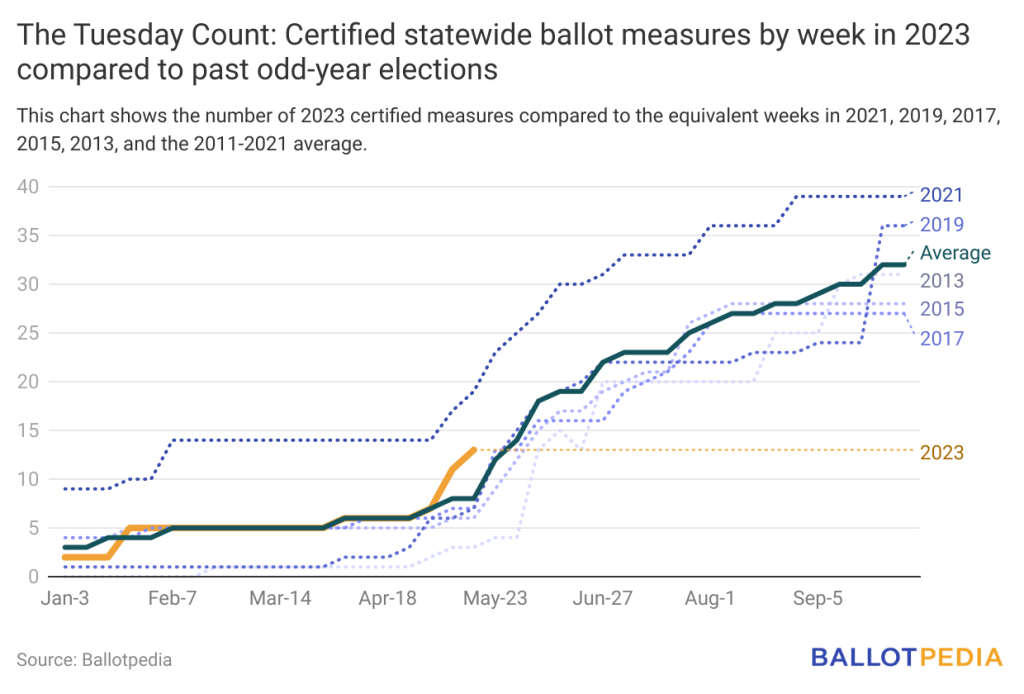Welcome to the Friday, May 19, Brew.
Here’s what’s in store for you as you start your day:
- 2023 sees highest number of public-sector union bills introduced in state legislatures since 2018
- An update on this year’s ballot measure certifications
- #FridayTrivia: Which state does not require voter approval to amend its constitution?
2023 sees highest number of public-sector union bills introduced in state legislatures since 2018
We’ve closely monitored and tracked public-sector union bills in state legislatures since the U.S. Supreme Court’s (SCOTUS) 2018 ruling in Janus v. AFSCME that public sector unions cannot require non-members to pay fees.
This year, we’re tracking 225 public-sector union bills in state legislatures—the most since 2018. Public-sector union legislation deals with topics that include collective bargaining, union membership, strikes and other labor actions, and more.

In 2023, Democrats have introduced 68% of these bills, a higher percentage than in previous years. The chart below shows the breakdown of these bills by sponsor party affiliation.

The states with the greatest increase in public-sector union legislation introduced from 2022 to 2023 are Maryland (13 more bills) and Minnesota (12 more bills), both states that gained Democratic trifectas as a result of 2022 elections.
We’ve tracked an average of 151 such bills since 2018. Previously, 2018, with 202 bills, was the year with the highest number of bills introduced. The year with the fewest was 2020, with 102.
Only a small share of all bills tend to get enacted. From 2018 to today, an average of 15 bills have been enacted each year, ranging from five bills in 2020 to 30 bills in 2018.
One recent story related to public-union legislation that has received national attention comes out of Florida. On May 9, Gov. Ron DeSantis (R) signed Senate Bill 256. Among other things, the bill prohibits most types of public-sector unions—except those representing law enforcement officers, correctional officers, correctional probation officers, and firefighters—from deducting union dues from employee paychecks and requires them to have the support of 60% of members.
Several unions across the state filed lawsuits the same day in response to the law.
Click here to read more about Senate Bill 256.
Here’s a look at some of the bills legislators are currently considering:
- Connecticut SB01199: This bill would provide that anyone holding an adjunct professor permit from the State Board of Education shall be a member of the exclusive bargaining unit for certified employees, unless the employer and bargaining unit agree otherwise.
- Michigan HB4233: This bill would allow public school employers to collect union dues from employees’ wages.
- Ohio SB83: This bill would amend a list of public employees who are not allowed to strike to include all employees of public higher education institutions..
You can stay up to date on public-sector union legislation at the link below.
An update on this year’s ballot measure certifications
We’re nearing the halfway point of the year (where does the time go?), so let’s check in on how the 2023 statewide ballot measure landscape is shaping up.
As of May 16, 13 statewide measures have been certified for the ballot in eight states for elections this year. That’s five more measures than the average number—eight—certified at this point in other odd-numbered years from 2011 to 2021. This is the time of year when many legislatures are wrapping up sessions—which usually leads to a busy period of new measures being certified for the ballot.

Here’s an update on the latest ballot measure activity.
Three new measures were certified for the 2023 ballot last week:
- Colorado Property Tax Changes and Revenue Change Measure
- Ohio 60% Vote Requirement to Approve Constitutional Amendments Measure
- Texas Increase Mandatory Retirement Age for State Judges Amendment
Two new measures were certified for the 2024 ballot last week:
- Colorado Independent Judicial Discipline Adjudicative Board Amendment
- Missouri Property Tax Exemption for Childcare Establishments Amendment
Signatures have been submitted and are pending verification for one initiative in Michigan:
Signatures were verified for three indirect initiatives in Maine, and the initiatives are now before legislators:
- Maine Prohibit Foreign Spending in Elections Initiative
- Maine Voter Approval of Borrowing Above $1 Billion by State Entities and Electric Cooperatives Initiative
- Maine “Right to Repair Law” Vehicle Data Access Requirement Initiative
In Ohio, one initiative to legalize marijuana was certified to the legislature, which had four months to act on the proposal; as the legislature took no action, a second 90-day signature-gathering period commenced on May 3.
For 2024, 34 statewide measures have been certified in 18 states. That’s five more measures than the average number certified at this point from 2010 to 2022.
Click below to read more.Keep reading
#FridayTrivia: Which state does not require voter approval to amend its constitution?
In the May 17 Brew, we discussed a legislatively referred measure in Ohio that would raise the threshold for voters to approve future constitutional amendments from a simple majority to 60%. Voters will decide the measure on Aug. 8.
While most states require a simple majority to amend the constitution, a handful of others require a supermajority or some other criteria that can affect the number of votes needed.
One state, however, does not require voter approval to amend its constitution. Which is it?
Learn More






